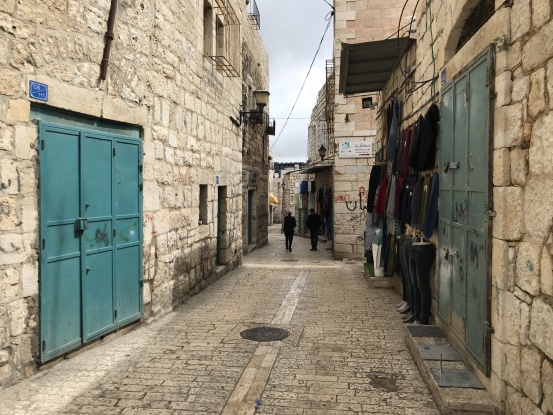BETHLEHEM – Two days ago, on March 5, Palestinian president Mahmoud Abbas declared a state of emergency in the city of Bethlehem for 30 days, a procedure that was put into place to fight the spread of the pandemic Coronavirus. The city was also placed under lockdown by Israel, which prevented the movement of Palestinians from and into the city for the same reason.
It is 10:30 am on this Saturday of March 7 in the Old City of Bethlehem. If anyone had the chance to live for some time in the city, one would know that Saturdays are the busiest days of the week in its marketplace. On a typical Saturday, hundreds of merchants and farmers make their way to Bethlehem from nearby villages to sell their goods and fresh produce. On this day of the week, making your way through the market means having patience, as movement sometimes is impossible.
However, on this Saturday, March 7, reality was different. Since the announcing of the Coronavirus cases in Bethlehem and the state of emergency that followed, panic had grown exponentially and it now seems to have had the last word.
“Saturday (in Bethlehem) was more like a festival day,” wrote Bethlehemite author Jabra Ibrahim Jabra in his 1986 autobiography “the First Well”, “and the streets of the town were crowded with people who come to buy and sell”. He continues: “Many buyers and sellers were women… and their shouts and laughter filled the air and added a special radiance to this weekly festival”. Saturday was the day for “the grocer, the barber, the bleacher, the tinsmith, the seller of halawa and the tanner.”
Taking a stroll in the streets that lead up to the market, I could quickly notice that they were almost empty of its people. “O Bethlehem! You became a ghost town,” lamented one shop owner. Most shops were closed and the ones that were open were empty of shoppers. The few people who were actually in the streets had one topic on their lips, behind their face masks: the novel Coronavirus.
I walked a little bit through the market and I entered a hardware store and the first thing I saw was boxes of hand sanitizers on the cashier’s desk. I wandered a bit in the store, curious to what the other shoppers were talking about and eventually buying. One shopper asked about the price of the hand sanitizers, while another wondered if the store sold disinfectant liquid for germs.
After walking for a while, I arrived at the Manger Square and as expected, it was empty and an unusual calm stifled the air. I stood before the Nativity Church and from a distance I saw its humility door shut closed. The closure of the church took effect two days ago.
There were no tourists in view as well. The decree of the Palestinian president required the cancellation of all bookings of international tourists in Bethlehem and the closure of all touristic and religious areas. However, Palestinian Prime Minister Mohammad Shtayyeh announced new precautions on Friday, March 6, one of which extended the cancellation of bookings in all Palestinian hotels.
On Friday, the Latin Patriarchate of Jerusalem also extended its new precautionary guidelines not only in “all parishes, all churches, chapels, religious houses and any other place of worship in the territory of Bethlehem, Beit Jala, Beit Sahour and Jericho” but to the entire territory of Palestine.
The number of confirmed cases of Coronavirus infections has reached 19 in the Bethlehem governorate as of Saturday evening. The first cases were discovered on Thursday at the Angel Hotel in the city of Beit Jala, where 32 people are currently under quarantine. Earlier today, and in a show of solidarity and morale boosting to those who are under quarantine at the hotel, a group of young people delivered food, beverages and disinfectants to the hotel.
On Saturday evening, Palestinian police closed the parameters of another hotel in Bethlehem, where 15 people are being quarantined.
One can easily foresee the negative impact of the current situation on the lives of people in Bethlehem, whose lifeline is the tourism sector. This means the unemployment of people working in hotels, tourism agencies, tour guiding, souvenir shops and restaurants.
By: Saher Kawas
Source: Latin Patriarchate of Jerusalem






